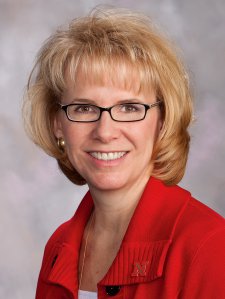 EUGENE, Ore. -- (April 13, 2011) -- Kimberly Andrews Espy, a clinical neuroscientist and associate vice chancellor for research at the University of Nebraska-Lincoln, will become vice president for research and innovation and dean of the Graduate School at the University of Oregon on July 1.
EUGENE, Ore. -- (April 13, 2011) -- Kimberly Andrews Espy, a clinical neuroscientist and associate vice chancellor for research at the University of Nebraska-Lincoln, will become vice president for research and innovation and dean of the Graduate School at the University of Oregon on July 1.
At UNL, Nebraska's flagship university, Espy spearheaded a concerted effort to increase interdisciplinary and strategic research initiatives. She replaces Richard Linton, who has served as the UO's vice president for research and graduate studies since 2001. Linton announced last year his plans to leave the post on or before June 30.
"Dr. Espy brings great passion and experience to UO that will enable us to build on the foundation developed during Rich Linton's time as vice president," said UO Senior Vice President and Provost James Bean. "Her experience with collaborative programs and high research growth at Nebraska makes her an ideal leader for future research successes at the University of Oregon."
The vice president for research and innovation reports to Bean, provides leadership and strategic direction for research efforts and programs and serves as the university's chief research officer. Espy will oversee most of the UO's multidisciplinary research centers and institutes, research infrastructure, compliance and regulatory environment, and innovation and commercialization efforts, including the research park. She also will be the UO's point person in the development of innovative partnerships and collaborations across the state. As dean of the Graduate School, Espy will oversee all aspects of the university's graduate education programs and administration.
Espy also has served as acting dean of Office of Graduate Studies at Nebraska since Jan. 1, 2010, supervising recruitment, enrollment and retention efforts.
She leaves a campus that had a 181-percent increase in total research funding awards over the last decade. During the same years, the UO saw a 135-percent increase under Linton's leadership.
Espy, who began her duties at Nebraska in 2005, was directly responsible for strategic interdisciplinary initiatives, research compliance and faculty development, and worked closely with the vice chancellor for research and economic development and his staff on matters pertaining to budget, policy and planning, administrative issues, facilities, communications and economic development.
"The UO has very talented faculty, staff and students, with a record of distinguished research, scholarship and graduate education," Espy said. "I am honored to be selected as the next vice president for research and innovation and dean of the Graduate School. I look forward to joining the administrative team and continuing to build on the UO's positive trajectory of accomplishment."
Espy -- one of UNL's distinguished Charles Bessey Professors -- has authored numerous peer-reviewed articles in developmental, pediatric and psychiatric journals. At the UO, she will hold a faculty position in the psychology department. At Nebraska, she directs the Developmental Cognitive Neuroscience Laboratory, a multidisciplinary research group. Her research is supported by the National Institutes of Health and focuses on characterizing how young children control their attention and behavior, and how these processes are affected by various pediatric, neurological and psychiatric disorders.
She earned a doctorate in clinical neuropsychology in 1994 from the University of Houston. She served as a postdoctoral fellow in the pediatrics department of the University of Arizona College of Medicine. Before going to Nebraska in 2005, Espy served nine years in the departments of psychology and family and community medicine at Southern Illinois University. She earned a bachelor's degree in psychology in 1985 from Rice University in Houston.
About the University of Oregon
The University of Oregon is among the 108 institutions chosen from 4,633 U.S. universities for top-tier designation of "Very High Research Activity" in the 2010 Carnegie Classification of Institutions of Higher Education. The UO also is one of two Pacific Northwest members of the Association of American Universities.